NSG6005 (NSG6005)
South University
All 39 resultados
Ordenador por
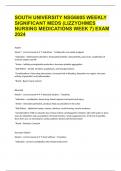
-
SOUTH UNIVERSITY NSG6005 WEEKLY SIGNIFICANT MEDS (LIZZYOHMES NURSING MEDICATIONS WEEK 7) EXAM 2024
- Examen • 12 páginas • 2024
-
- $13.49
- + aprende más y mejor
SOUTH UNIVERSITY NSG6005 WEEKLY SIGNIFICANT MEDS (LIZZYOHMES NURSING MEDICATIONS WEEK 7) EXAM 2024 Aspirin Week 7 - correct answer P salicylates - T antipyretic non opioid analgesic *Indication - inflammatory disorders; rheumatoid arthritis, osteoarthritis, pain, fever, prophylaxis of ischemic attacks and MI *Action - Inhibits prostaglandin production, decreases platelet aggregation *Side Effects - tinnitis, GI bleed, anaphylaxis, and laryngeal edema *Considerations- Many drug interact...
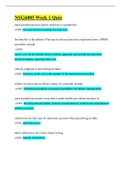
-
NSG6005 Week 1:NSG 6005 Week 2 Pharmacology Quiz:NSG 6005 Week 3 Quiz:NSG 6005: Advanced Pharmacology Final Exam:NSG 6005: Advanced Pharmacology MidTerm Exam:NSG 6005 Final Exam Test Bank: Guaranteed A+ Score Solutions : Updated
- Lote • 8 artículos • 2024
-
- $16.49
- + aprende más y mejor
NSG6005 Week 1:NSG 6005 Week 2 Pharmacology Quiz:NSG 6005 Week 3 Quiz:NSG 6005: Advanced Pharmacology Final Exam:NSG 6005: Advanced Pharmacology MidTerm Exam:NSG 6005 ADVANCED PHARMACOLOGY FINAL EXAM TEST BANK
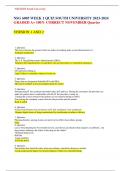
-
NSG6005 Advanced Pharmacology SOUTH UNIVERSITY SUMMER 2024 COMPLETE REAL AND AUTHENTIC EXAMS |ACCURATE WEEK 5 AND 10 TERMS 100% CORRECT GRADED A
- Lote • 14 artículos • 2023
-
- $50.49
- + aprende más y mejor
NSG6005 Advanced Pharmacology ENTIRE COURSE SOUTH UNIVERSITY 2023-2024 COMPLETE REAL AND AUTHENTIC EXAMS |ACCURATE WEEK 5 AND 10 TERMS STARTS NOVEMBER |WEEKLY QUIZ ,MINDTERM AND FINAL EXAM
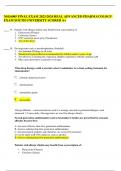
-
NSG6005 FINAL EXAM REAL ADVANCED PHARMACOLOGY EXAM SOUTH UNIVERSITY SCORED A+
- Examen • 26 páginas • 2023
- Disponible en paquete
-
- $13.00
- + aprende más y mejor
NSG6005 FINAL EXAM REAL ADVANCED PHARMACOLOGY EXAM SOUTH UNIVERSITY SCORED A+

-
NSG6005 FINAL EXAM SOUTH UNIVERSITY COMPLETE VERIFIED EXAM VERSION 2/RETAKE ADVANCED PHARMACOLOGY
- Examen • 13 páginas • 2023
- Disponible en paquete
-
- $13.49
- + aprende más y mejor
NSG6005 FINAL EXAM SOUTH UNIVERSITY COMPLETE VERIFIED EXAM VERSION 2/RETAKE ADVANCED PHARMACOLOGY
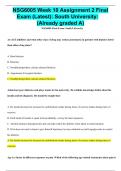
-
NSG6005 Week 10 Assignment 2 Final Exam (Latest): South University: (Already graded A)
- Examen • 36 páginas • 2023
-
- $16.99
- + aprende más y mejor
NSG6005 Week 10 Assignment 2 Final Exam (Latest): South University: (Already graded A) NSG6005 Final Exam: South University An ACE inhibitor and what other class of drug may reduce proteinuria in patients with diabetes better than either drug alone? A. Beta blockers B. Diuretics C. Nondihydropyridine calcium channel blockers D. Angiotensin II receptor blockers C. Nondihydropyridine calcium channel blockers Adam has type I diabetes and plays tennis for his universit...
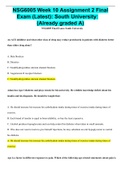
-
NSG6005 Week 10 Assignment 2 Final Exam (Latest): South University: (Already graded A)
- Examen • 36 páginas • 2022
-
- $11.49
- + aprende más y mejor
An ACE inhibitor and what other class of drug may reduce proteinuria in patients with diabetes better than either drug alone? A. Beta blockers B. Diuretics C. Nondihydropyridine calcium channel blockers D. Angiotensin II receptor blockers C. Nondihydropyridine calcium channel blockers Adam has type I diabetes and plays tennis for his university. He exhibits knowledge deficit about his insulin and his diagnosis. He should be taught that: A. He should increase his incr...
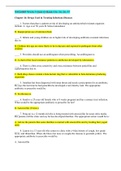
-
NSG6005 Week 3 Quiz Q Bank Ch: 24, 26, 37
- Examen • 6 páginas • 2022
-
- $10.00
- + aprende más y mejor
Chapter 24: Drugs Used in Treating Infectious Diseases ____ 1. Factors that place a patient at risk of developing an antimicrobial resistant organism include: A. Age over 50 years B. School attendance D. Inappropriate use of antimicrobials ____ 2. Infants and young children are at higher risk of developing antibiotic-resistant infections due to: B. Children this age are more likely to be in daycare and exposed to pathogens from other children ____ 3. Providers should use an antibiogram w...
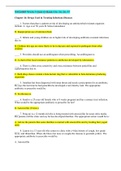
-
NSG6005 Week 3 Quiz Q Bank Ch: 24, 26, 37
- Examen • 6 páginas • 2022
-
- $10.00
- + aprende más y mejor
Chapter 24: Drugs Used in Treating Infectious Diseases ____ 1. Factors that place a patient at risk of developing an antimicrobial resistant organism include: A. Age over 50 years B. School attendance D. Inappropriate use of antimicrobials ____ 2. Infants and young children are at higher risk of developing antibiotic-resistant infections due to: B. Children this age are more likely to be in daycare and exposed to pathogens from other children ____ 3. Providers should use an antibiogram w...

5,99 euros por el resumen de tu libro de texto multiplicado por 100 compañeros... Haz cuentas: ¡eso es mucho dinero! No seas ladrón de tu propia cartera y empieza ya a subir el tuyo. Descubre todo sobre cómo ganar en Stuvia


